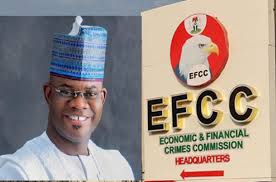In a surprising twist of events, Governor Yahaya Bello finds himself stranded in the Government house as he reportedly avoids going to his hometown Okene. The reason behind this sudden change in plans is believed to be the intensified investigation by the Economic and Financial Crimes Commission (EFCC), which is allegedly targeting the governor.
Speculations surrounding Governor Bello’s involvement in corrupt practices have been circulating for some time, prompting the EFCC to launch a thorough investigation into his financial activities. As the probe gained momentum.
Unfortunately for Governor Bello, it appears that these fears have become a reality. Sources indicate that he has chosen to remain in the Government house, presumably to avoid any potential confrontation with the EFCC. This unexpected turn of events has left the governor unable to return to his hometown, where he likely faces mounting pressure and scrutiny from the public.
The EFCC’s interest in Governor Yahaya Bello stems from allegations of embezzlement and misappropriation of public funds during his tenure. These accusations have sparked outrage among the citizens, who are demanding accountability and justice for their elected officials.
The EFCC’s investigation into Governor Bello’s financial activities is part of the agency’s ongoing efforts to combat corruption at all levels of government. Their relentless pursuit of corrupt individuals, regardless of their political affiliations or positions of power, has been commendable.
As news of Governor Bello’s predicament spreads, it has ignited further discussions about the effectiveness of anti-corruption measures in Nigeria. Critics argue that the governor’s apparent ability to avoid returning to Okene raises doubts about the government’s commitment to fighting corruption. They question whether influential figures are able to evade accountability, undermining the credibility of the anti-corruption campaign.
The EFCC has not released an official statement regarding Governor Bello’s situation or the progress of their investigation. However, the public eagerly awaits updates on the matter, hoping for transparency and swift action against any wrongdoing.
The current circumstances surrounding Governor Yahaya Bello highlight the urgent need for stronger anti-corruption measures and a more robust system of checks and balances. It is crucial that those found guilty of corruption face the appropriate consequences, regardless of their political status or connections.
As the investigation unfolds, the nation’s focus remains on upholding the principles of justice and ensuring that the rule of law prevails. The outcome of the EFCC’s investigation into Governor Bello will undoubtedly have significant implications for Nigeria’s fight against corruption and its pursuit of good governance.


